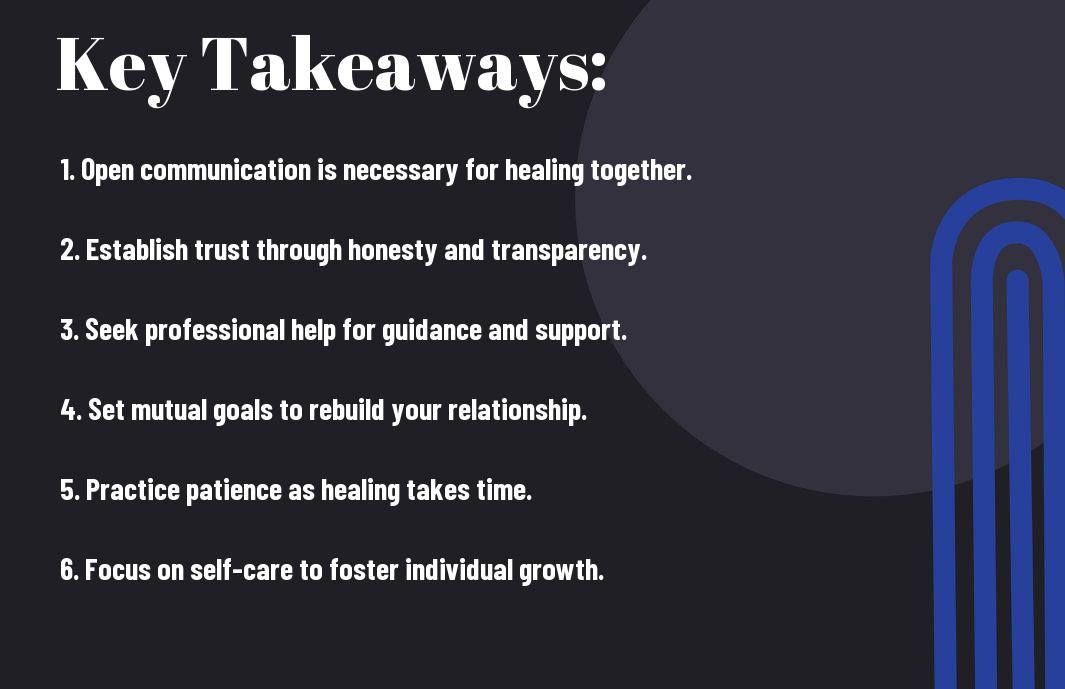Infidelity can shatter the foundation of your marriage, leaving you feeling lost and betrayed. However, it’s important to understand that healing is possible and that your relationship can emerge stronger than before. This guide will equip you with proven steps to navigate the emotional turmoil, rebuild trust, and restore intimacy with your partner. By focusing on communication, honesty, and mutual commitment, you can pave the way to a more resilient marriage that honors both your feelings and your shared future.
Key Takeaways:
- Open communication is crucial; both partners should express their feelings honestly and constructively.
- Seek professional help, such as couples therapy, to guide the healing process and provide support.
- Establish new boundaries to rebuild trust and ensure safety in the relationship.
- Allow time for healing; understand that recovery from infidelity is a gradual process.
- Work on individual self-improvement to strengthen personal resolve and contribute positively to the relationship.
- Focus on emotional connection by engaging in activities that foster intimacy and collaboration.
- Evaluate the marriage’s future; reassess goals and commitments together to ensure alignment moving forward.


Understanding Infidelity
A straightforward definition of infidelity can be a complex undertaking. You must recognize that infidelity transcends just physical encounters; it can encompass emotional bonds forged outside your marriage. Understanding the underlying factors that contribute to this breach of trust is important for addressing underlying issues and navigating the path toward healing.
Types of Infidelity
Among the many forms of infidelity, each can significantly impact your relationship differently:
| Emotional Infidelity | Forming a deep emotional connection with someone outside your marriage. |
| Physical Infidelity | Engaging in a sexual relationship outside of your committed partnership. |
| Cyber Infidelity | Online relationships involving emotional or sexual interactions through digital means. |
| One Night Stands | Engaging in a brief sexual encounter without emotional involvement. |
| Repeated Affairs | Engaging in ongoing, multiple infidelity incidents over time. |
Recognizing the type of infidelity you face is the first step toward understanding the depth of the betrayal and addressing its implications.
The Impact of Betrayal
Around 70% of couples experience some form of betrayal in their marriage, leading to profound consequences. The aftermath can manifest in various forms, including intense emotional pain, a drastic shift in trust, and deep feelings of inadequacy for the betrayed partner. You may feel disoriented, angry, and confused about how your relationship reached this point.
But the impact of betrayal extends beyond the immediate turmoil; it can disrupt your entire life. Trust is not easily rebuilt, and you may grapple with feelings of shame, loss, and even isolation. Acknowledging your feelings is important, as is understanding that the process of healing can bring about a new perspective on your relationship. Ultimately, transformative growth may occur as you navigate this challenging experience together, reinforcing your commitment to each other in a healthier, more trusting way.
Initial Steps to Take
Even in the wake of infidelity, taking initial steps toward healing is imperative for restoring your marriage. You must first acknowledge the reality of the situation and allow yourself to process the emotions that arise. Rushing into decisions can lead to further complications, so give yourself time to reflect on your feelings and the impact on your relationship.
Assessing Emotions
Among the first actions you should consider is assessing your emotions. Understanding your feelings—be it anger, sadness, or confusion—can provide clarity about what you need moving forward. Reflecting on your emotional state equips you to communicate more effectively with your partner.
Communicating Openly
Between you and your partner, open communication is vital for rebuilding trust and understanding. Expressing your feelings and listening to your partner’s perspective fosters a safe environment for both to share thoughts. This openness can significantly help in addressing the pain caused by infidelity.
Indeed, establishing open lines of communication requires honesty and vulnerability. Approach conversations with a willingness to listen and express without assigning blame. You need to create a safe space where both you and your partner can articulate feelings and discuss what led to the infidelity. This dialogue is fundamental for healing, as it allows you to uncover underlying issues in your relationship and explore paths toward resolution and reconnection. Prioritize empathy during these discussions, as it is imperative for fostering understanding and support, laying the groundwork for a healthier future together.
Rebuilding Trust
After infidelity, rebuilding trust can seem like a daunting task, but it is important for restoring your marriage. Trust is the foundation of a healthy relationship, and both partners must actively participate in the process. This chapter will research into the steps you can take to foster an environment where trust can thrive again, ensuring that both you and your partner feel safe and secure moving forward.
Honesty and Transparency
One of the most important elements in rebuilding trust is maintaining honesty and transparency. You need to openly communicate about your feelings, fears, and any lingering questions about the infidelity. This level of honesty allows both partners to understand where they stand and the effort each is willing to put into healing the relationship.
Setting Boundaries
Honesty is vital, but setting boundaries is equally important in rebuilding trust. Boundaries help to create a safe space where both partners can express their needs and expectations. Establishing clear boundaries lets you determine what is acceptable behavior, fostering respect and understanding in your relationship.
It is important to define your boundaries together as a couple. Doing so enables you to articulate your needs while allowing your partner to express theirs. Discuss what actions may make you uncomfortable or trigger feelings of distrust. Be open to listening to each other’s concerns, and agree on specific guidelines that strengthen your commitment. Following these boundaries consistently will create a more secure environment, allowing both you and your partner to focus on nurturing your relationship without the fear of repeated breaches of trust.
Seeking Professional Help
For many couples, navigating the emotional turmoil after infidelity can feel overwhelming. Seeking professional help can provide a safe space for both partners to communicate openly and work through their feelings. A therapist experienced in infidelity can guide you in understanding the underlying issues that led to the betrayal and help you rebuild trust in your marriage.
Couples Therapy
After an infidelity, couples therapy can serve as a beneficial platform for both partners to openly discuss their emotions. It allows you to explore the reasons behind the betrayal and to establish new communication patterns, fostering a supportive environment where healing can truly begin.
Individual Counseling
On the journey to recovery, individual counseling can offer you personalized insights and coping strategies that cater to your unique emotional state. This one-on-one experience can help you understand your own feelings and motivations, allowing you to evolve in ways that will enhance your relationship.
Plus, individual counseling empowers you to address personal issues that may have contributed to the infidelity, paving the way for self-discovery and growth. By reflecting on your own emotions and needs, you can build a stronger foundation for your marriage. In some cases, addressing unresolved personal trauma or fears about intimacy may also lower the risk of future betrayals. This process not only supports your healing but also enriches your partnership, fostering a deeper, more empathetic bond moving forward.

Reconnecting Intimately
Many couples begin to heal and rebuild their marriage by An Important Key to Healing a Marriage after an Affair is restoring intimacy. This process involves both emotional and physical aspects, allowing partners to reconnect and rediscover their bond. Taking intentional steps to enhance intimacy can significantly strengthen your relationship and pave the way for a future built on trust and understanding.
Emotional Intimacy
Behind the barriers that infidelity creates, emotional intimacy is vital for healing. It requires open communication, vulnerability, and a willingness to share your feelings and fears. By creating a safe space for honest dialogue, you can begin to rebuild trust and foster a deeper connection with your partner.
Physical Intimacy
Above all, physical intimacy plays a vital role in reviving your relationship after an affair. It involves more than just sexual encounters; it encompasses affection, touch, and being close. Engaging in non-sexual physical activities can help restore your bond and create a sense of comfort between you and your partner.
A genuine commitment to rebuilding physical intimacy may involve exploring new ways to connect, like cuddling, holding hands, or sharing small gestures of affection. These simple acts can foster a sense of closeness and safety. It’s vital to communicate openly about your desires and boundaries to avoid overwhelming each other. Taking these steps with patience and understanding can lead to a more fulfilling and trusting relationship.
Long-term Strategies for Healing
Unlike the quick fixes that may tempt you, effective long-term strategies for healing after infidelity involve sustained effort and commitment from both partners. It’s crucial to focus on rebuilding trust and communication over time, ensuring a more resilient connection. These strategies can lead to a deeper understanding of each other’s needs and desires, ultimately helping you navigate future challenges more successfully.
Establishing New Norms
Along your healing journey, establishing new norms in your relationship is vital. This involves openly discussing your expectations and boundaries, creating a shared vision for your future together. By redefining your relationship dynamics, you can build a stronger foundation that prioritizes respect, honesty, and emotional safety.
Practicing Forgiveness
Establishing forgiveness as a regular practice is crucial for moving forward together. It’s important to acknowledge your feelings, allowing yourself to experience the full spectrum of emotions that arise from the betrayal. Only through this process can you begin to let go of the pain and resentment that may linger, making space for healing and renewal.
It is vital to understand that practicing forgiveness involves both acknowledgment of hurt and a willingness to release past grievances. This doesn’t mean condoning the betrayal but rather making a conscious choice to let go of the negative feelings tied to the infidelity. Engaging in open conversations about your emotions and the impact of the betrayal helps create an environment where healing can occur. By genuinely working towards forgiveness, you transform the dynamic in your marriage, fostering a new sense of hope and connection for the future.
Summing up
On the whole, healing after infidelity requires a commitment to open communication, rebuilding trust, and allowing space for emotional processing. By actively engaging in honest conversations, seeking professional guidance if needed, and setting clear boundaries, you can both work towards restoring your marriage. Acknowledge your feelings and those of your partner, and take proactive steps to foster understanding and connection. With patience and effort, you can emerge from this challenging experience with a stronger, more resilient relationship.
FAQ
Q: What are the first steps to take after discovering infidelity in a marriage?
A: The initial steps involve open communication and allowing both partners to express their feelings. It’s important for the betrayed partner to share their emotions and for the unfaithful partner to take responsibility for their actions. Consider seeking professional help, such as couples therapy, to facilitate these conversations and guide both partners through the healing process.
Q: How can I rebuild trust after infidelity has occurred?
A: Rebuilding trust takes time and consistent effort from both partners. The unfaithful partner should be transparent and honest about their actions, as well as addressing any underlying issues that may have contributed to the affair. The betrayed partner needs to communicate their needs and set clear boundaries. Engaging in activities that foster emotional intimacy can also help in regaining trust over time.
Q: What role does forgiveness play in healing after infidelity?
A: Forgiveness is an necessary element in the healing journey for both partners. The betrayed partner should work towards forgiving the unfaithful partner, which can help alleviate anger and resentment. The unfaithful partner must also seek forgiveness and show genuine remorse for their actions. Forgiveness doesn’t mean forgetting; instead, it allows both individuals to move forward without being shackled by past pain.
Q: Should we consider professional counseling or therapy for our marriage?
A: Engaging with a professional counselor or therapist is highly beneficial during the healing process. A trained therapist can provide a safe space for both individuals to express their feelings, guide discussions, and offer strategies to cope with the aftermath of infidelity. Therapy can not only assist in addressing immediate issues but also help strengthen the relationship for the future.
Q: What long-term strategies can help ensure that infidelity does not happen again?
A: Long-term strategies involve improving communication and establishing healthy relationship habits. Both partners should openly discuss their needs and expectations, and commit to regularly checking in on the relationship. Investing time into strengthening the emotional and physical connection, as well as engaging in shared activities, can foster a more resilient partnership and reduce the likelihood of similar issues arising in the future.
